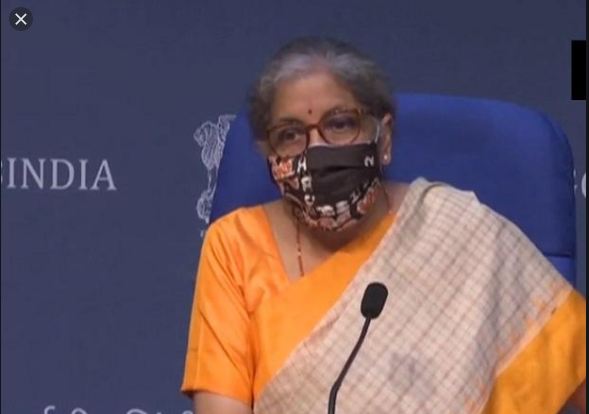Virendra Pandit
New Delhi: In yet another series of measures to give a booster dose to India’s Covid-19-hit economy and increase capital expenditure, Finance Minister Nirmala Sitharaman, on Thursday, announced schemes as part of the new Atma Nirbhar 3.0 stimulus package worth Rs. 2,65,080 crore.
Amid some green shoots seen at the end of the second quarter of fiscal 2020-21, the Indian economy is still expected to enter into a technical recession for the first time in history. To meet the situation, she outlined a broader scheme to incentivize job creation, measures for 26 stressed sectors, and benefits for home buyers and real estate developers as part of the Rs. two trillion packages.
With this, the Modi government has so far provided stimulus worth about 15 percent of Grand National Product (GDP), including a government contribution of 9 percent.
Asserting that the country’s economy was witnessing a strong recovery, Sitharaman announced an “Aatmanirbhar Bharat Rozgar Yojana”, under which the Employees’ Provident Fund (EPF)-registered organizations would get benefits on recruiting new people who did not have EPFO benefits before or those who lost their jobs between March 1 and September 30, 2020.
The scheme will cover new employees recruited in EPFO-registered establishments on monthly wages of up to Rs 15,000. It will also cover EPF members drawing monthly wages of less than Rs 15,000, who lost their jobs during the pandemic from March 1, 2020, and got employed on or after October 1, 2020.
“The employees’ and employer’s contribution (12 percent of wages each), totaling 24 percent of wages, would be given to establishments for two years,” Sitharaman said.
However, to avail of the scheme, which will be operational till June 30, 2021, establishments with up to 50 employees will have to add a minimum of two new employees and those with more than 50 staff will have to create at least five new jobs.
To boost rural employment, she announced an additional outlay of Rs 10,000 crore under the PM Garib Kalyan Rozgar Yojana in the current financial year. In the 2020-21 Budget, the government had provided Rs 61,000 crore for MNREGA and an extra Rs 40,000 crore in the first AtmaNirbhar package. So far, Rs 73,500 crore has already been spent, she added.
For 26 stressed sectors identified by the K.V. Kamath Committee, the government has extended the Emergency Credit Line Guarantee Scheme (ECLGS) until March 31, 2021. “The original ECLGS had one year of the moratorium and 4 years of repayment while the new scheme will have a one-year moratorium and 5 years of repayment,” the FM said, adding that Rs 2.05 lakh crore had been sanctioned to 61 lakh borrowers and Rs 1.52 lakh crore disbursed so far.
The measures also include the earlier announcement of production-linked incentives (PLIs) worth about $27 billion (Rs 2.05 lakh crore) over five years for manufacturers in 10 sectors.
In another measure under the Pradhan Mantri Awas Yojana that will help completion of 18 lakh houses, Sitharaman said Rs 18,000 crore would be provided over and above the estimates mentioned in the Budget.
In a decision that could benefit home buyers and real estate developers, Sitharaman unveiled relaxations in income tax rules to allow the sale of primary residential units of up to Rs 2 crore value below the circle rate.
Until now, only a 10 percent difference between the circle rate and the agreement value was allowed, which has now been increased to 20 percent up to June 30, 2021. “This will reduce hardships faced by both home-buyers and developers and help in clearing the unsold inventory,” she said.
Besides, to help this sector raise money, the government will infuse Rs 6,000 crore equity in the National Investment and Infrastructure Fund (NIIF) Debt Platform. To shore up investment, there will also be an extra outlay of Rs 10,200 crore towards capital expenditure apart from the Rs 25,000 crore provision already made for roads, ports, and defense projects.
“This will create demand for domestic defense equipment, green energy, and industrial infrastructure,” she said.

